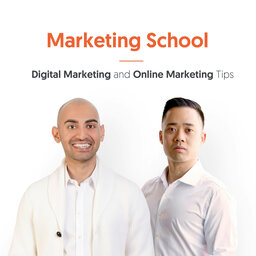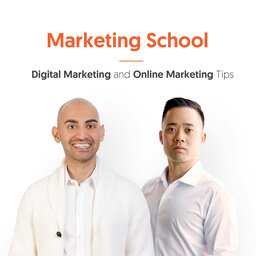How Jake Tran Made One Tweak To Skyrocket His YouTube to 1M Subs #2072
Any incumbent YouTuber will tell you that getting your content to stand out above the rest has become infinitely more competitive than in the early days of YouTube. As a result, individuals and businesses often become discouraged when they don’t see their audience grow in the way they expected within the first few months, or even years, of their channel. Today on the show we get together with Jake Tran, an up-and-coming YouTuber who creates in-depth business video essays on money, power, and crime, to uncover exactly what it takes to be a successful YouTuber, and some of the business strategies that can help you achieve it. We talk with Jake about how he became a YouTuber, why slow growth is normal, and the one video topic and subsequent share that had a massive impact on his total number of views. Jake unpacks his economic model for us, as well as some of the recent changes he’s made and explains why he is dedicated to providing more value than subscribers pay for. He also delves into some of the business concepts that have shaped his outlook, most notably the concept of a blue ocean, how it impacted his channel, and what his plans are for the future. If you’re intimidated by starting a YouTube channel, or are eager to grow the one you currently have, make sure you tune in today!
TIME-STAMPED SHOW NOTES:
- [00:20] Today’s topic: How Jake Tran Made One Tweak To Skyrocket His YouTube to 1M Subs(MS).
- [00:30] Introducing today’s guest Jake Tran, who creates business essays on YouTube.
- [01:07] Why Jake chose to focus his video essays on money, power, and crime.
- [02:11] Jake’s YouTube journey, and why his latest venture started with two channels.
- [04:32] How trying to imitate someone else’s YouTube channel can inhibit your growth.
- [05:52] The concept of a blue ocean and how Jake implemented its lessons about eliminating the competition to elevate his YouTube channel.
- [07:48] The nature of creative work and the amount of time Jake typically spends on a video.
- [08:20] The dilemma of time spent creating quality videos in relation to the number of views at the start of your career.
- [09:02] How having his video shared on a prominent channel boosted Jake’s numbers.
- [10:16] An overview of Jake’s comprehensive research process.
- [11:17] Jake’s insights on what to avoid if you’re trying to grow your YouTube channel.
- [12:27] The economics of being a YouTuber and where they earn their revenue through AdSense and sponsorships.
- [14:08] Jake’s economic model, his new Join button, and his long-term plan.
- [16:36] Hear about Jake’s nomadic lifestyle, being a Renaissance man, and what he prioritizes in his life.
- [20:21] The surprising amount of times Jake has been recognized from his YouTube channel.
- [21:20] Jake’s top business tool and book recommendations.
- [23:36] That’s it for today! Don’t forget to rate, review and subscribe!
- [23:36] Go to https://marketingschool.io/live to learn more!
Links Mentioned in Today’s Episode:
- Jake Tran on LinkedIn
- Jake Tran on YouTube
- Jake Tran on Instagram
- Jake Tran on TikTok
- Graham Stephan on YouTube
- Marques Brownlee on YouTube
- Must-read book: The Millionaire Fastlane: Crack the Code to Wealth and Live Rich for a Lifetime
- Subscribe to our premium podcast (with tons of goodies!): https://www.marketingschool.io/pro
Leave Some Feedback:
- What should we talk about next? Please let us know in the comments below
- Did you enjoy this episode? If so, please leave a short review.
Connect with Us:
Learn more about your ad choices. Visit megaphone.fm/adchoices
 Marketing School - Digital Marketing and Online Marketing Tips
Marketing School - Digital Marketing and Online Marketing Tips


